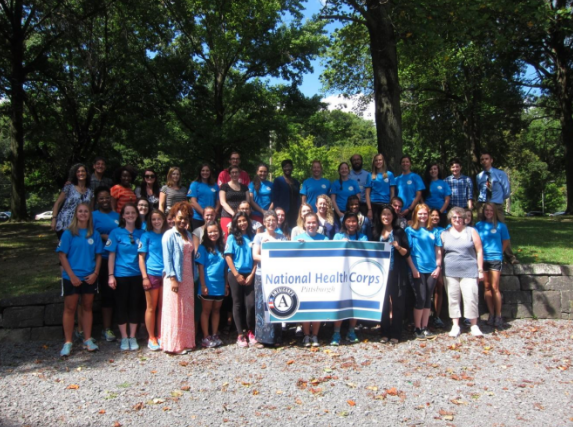Corps Collaboration
This post was written by Abby Smith, a Maternal Child Health Coordinator at UPMC Shadyside.
Tackling Pittsburgh’s public health challenges on the community level wouldn’t be possible without multidisciplinary, collaborative efforts — especially between our NHC members! Though our Corps is only 20 people, our wide range of roles and service sites in Pittsburgh represents the diverse, multidisciplinary nature of the field of public health in general. I’m specifically serving as a Maternal Child Health Coordinator, but almost everyone in the Corps is doing service that is or could be relevant in some way to the health of moms and their children, and my service is in turn relevant to many other positions. I can learn a lot from my fellow NHC members, and how they’re serving at their host sites.
With our members serving at many types of sites and in unique roles, but also planning to work together on projects and initiatives, it is crucial that we have a well-rounded understanding of how to work with individuals from different backgrounds and all walks of life. Our NHC pre-service orientation set the stage for understanding more about public health problems and health disparities in Pittsburgh, and about the importance of being culturally competent in interactions with the patients and clients we’ll serve. Our introduction to specific health challenges common in Pittsburgh communities helped us get a better sense of the populations we’ll be working with and the barriers they face in accessing and receiving care.
Going forward, we’ll apply this knowledge at our host sites and communities across Pittsburgh and when we come together to share knowledge and collaborate on projects. As a Maternal Child Health Coordinator I’ll be focused on improving the health of moms at the Shadyside Family Health Center, but to best serve my clients it will be important that I can work with professionals from various disciplines, and other members in different roles. Our training in health disparities and cultural competency has left me feeling more prepared to work with both colleagues and clients who have different life experiences and backgrounds than I do. After our pre-service orientation, I feel more knowledgeable about the barriers to care people in Pittsburgh face, and the resources available to help address those obstacles to good health.
Helping moms at the Shadyside Family Health Center achieve better health and empowering them to change their health behaviors wouldn’t be possible without collaboration and knowledge sharing with other NHC Pittsburgh members. Another member at my site is working on mental health, relevant to one of the key risk factors—depression—moms face postpartum, and we plan to work together on addressing this important issue. I’ll be referring moms who smoke, if they’re interested, to a smoking cessation program through the Allegheny County Health Department, and can hopefully work with the members at the health department to help these moms access the resources they need. Many more members—who are working on nutrition education, mental health, helping clients access social services, and more—have valuable knowledge and skills that I can certainly learn from to improve the service I provide at my host site. All of our members all benefit from learning about and working with each other on public health challenges in Pittsburgh communities, just as we will rely on working with professionals from all disciplines to best serve clients at our host sites.